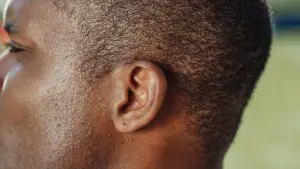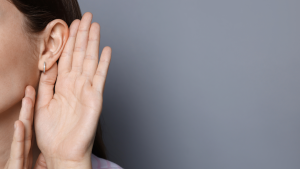Hearing is something many of us take for granted—until it starts to fade. While hearing loss can result from aging, genetics, or illness, a surprising amount of it is actually preventable. Just like we take steps to protect our heart or maintain strong bones, our ears deserve the same care and attention. The good news? Many of the habits that support overall health also benefit your hearing.
From the food you eat to the way you manage sound in your environment, your daily choices play a powerful role in preserving your ability to hear. And it’s never too early—or too late—to start making those changes. Whether you’re already noticing subtle signs of hearing difficulty or simply want to maintain strong hearing for years to come, adopting a few simple habits can make a meaningful difference.
This article will explore how everyday lifestyle decisions impact your ears and what you can do to protect them naturally. With a little intention and awareness, you can enjoy better hearing health—and a fuller connection to the world around you—for life.
Understanding How Hearing Works—and Why It Wears Down
To appreciate how lifestyle choices influence hearing health, it helps to understand how the ear works. Your hearing system is a delicate network made up of the outer ear (which funnels sound), the middle ear (which amplifies vibrations), and the inner ear, where thousands of tiny hair cells in the cochlea convert sound into electrical signals. These signals then travel to your brain, where they are interpreted as the sounds you recognize and understand.
Unfortunately, this intricate system is vulnerable to damage—especially the hair cells in the inner ear. These cells do not regenerate. Once they’re damaged by loud noise, poor circulation, toxins, or even natural aging, the effects are permanent. That’s why hearing loss is often gradual and irreversible.
Common Types of Hearing Loss
- Age-related hearing loss (presbycusis): A natural decline in hearing sensitivity, often starting after age 50, due to degeneration of inner ear structures.
- Noise-induced hearing loss (NIHL): Caused by repeated exposure to loud sounds over time or a sudden extremely loud noise.
- Sensorineural hearing loss: Often related to nerve damage, this type is the most common and usually permanent.
- Conductive hearing loss: Caused by blockages or damage to the outer or middle ear (like wax buildup or infections), and is often treatable.
Why Lifestyle Matters
While some hearing loss is inevitable with age, many contributing factors are within your control. For example, protecting your ears from loud environments, maintaining a healthy diet, avoiding harmful substances, and ensuring good cardiovascular health all influence how well your auditory system functions over time.
Understanding this relationship makes hearing preservation an active process—one that rewards consistent, mindful habits. The sections that follow will outline these habits and offer practical, everyday ways to protect your hearing naturally.
Noise Exposure: The Most Preventable Cause of Hearing Loss
Among all the threats to hearing health, noise exposure stands out as the most preventable. Continuous or sudden exposure to loud sounds can permanently damage the delicate hair cells in your inner ear. Once these cells are gone, they cannot be repaired or replaced. That’s why protecting your ears from harmful noise is one of the most powerful lifestyle choices you can make.
Understanding Dangerous Sound Levels
Sound is measured in decibels (dB), and hearing damage can occur at levels as low as 85 dB with prolonged exposure. For context:
- Normal conversation: ~60 dB
- City traffic (inside a car): ~85 dB
- Lawnmower: ~90 dB
- Rock concert or nightclub: 100–120 dB
- Gunshot or firecracker: 140 dB+
The louder the sound, the less time it takes to cause damage. At 100 dB, just 15 minutes of unprotected exposure can lead to hearing loss.
Safe Listening Practices
- Use Ear Protection: If you’re exposed to loud environments—like concerts, construction sites, or even using power tools—wear earplugs or noise-cancelling earmuffs. Many modern earplugs are designed to reduce volume without distorting sound quality.
- Monitor Personal Audio Use: Headphones and earbuds can be a hidden danger. Keep the volume at no more than 60% of the maximum and take regular breaks (the 60/60 rule—60% volume for 60 minutes—works well).
- Use Noise Apps: Smartphone apps can measure decibel levels in your environment. If the reading is consistently over 85 dB, it’s time to take action.
- Create Quiet Spaces: At home or work, aim to reduce background noise and take listening breaks. Even 15 minutes of quiet time can help your ears recover from noise exposure.
- Protect Children’s Hearing: Kids’ ears are even more sensitive than adults’. Monitor their exposure to loud toys, video games, and music.
Workplace Considerations
If you work in a noisy environment, your employer should provide hearing protection and conduct regular noise assessments under UK health and safety law. Don’t hesitate to speak up if you feel your hearing is at risk—your long-term health is worth it.
By making noise awareness a part of your daily routine, you can significantly reduce your risk of hearing damage. It’s a simple, effective way to preserve your hearing naturally—starting today.
Diet and Hearing: The Surprising Connection
You might not think about your diet when considering your hearing health, but the nutrients you consume play a key role in maintaining your auditory system. Just as a balanced diet supports your heart, brain, and immune system, it also helps protect the delicate structures of the inner ear and the nerves that carry sound to the brain.
Nutrients That Support Hearing Health
- Magnesium – Found in bananas, spinach, avocados, and dark chocolate, magnesium helps protect the inner ear from damage caused by noise exposure. It may reduce the effects of free radicals, which can harm sensitive hair cells in the cochlea.
- Omega-3 Fatty Acids – These healthy fats, abundant in oily fish like salmon and mackerel, support blood circulation to the inner ear and may help slow age-related hearing loss.
- Folate and B Vitamins – Leafy greens, beans, eggs, and fortified cereals are rich in folate and B12, which help regulate homocysteine levels. High levels of this amino acid can reduce blood flow to the ear and increase the risk of hearing damage.
- Zinc – Important for immune function and tissue repair, zinc (found in pumpkin seeds, chickpeas, and shellfish) may help the body ward off ear infections that could affect hearing.
- Vitamin C and E – These antioxidants help combat oxidative stress, a contributing factor in hearing decline. Citrus fruits, nuts, and seeds are excellent sources.
Hydration and Ear Health
Staying well-hydrated supports every system in the body, including hearing. Dehydration can affect fluid levels in the inner ear, which may impact balance and sound transmission. Aim to drink at least 6–8 glasses of water daily, more if you’re active or in hot weather.
Foods to Limit
- Excess salt – High sodium levels can increase blood pressure and potentially affect inner ear circulation.
- Sugar and processed carbs – These can contribute to inflammation and may exacerbate hearing loss in the long term.
- Caffeine and alcohol (in excess) – Both can temporarily affect inner ear function and, over time, may contribute to damage if consumed heavily.
Putting It Into Practice
Incorporate hearing-friendly foods into your daily meals. Start the day with a spinach omelette, snack on nuts and berries, choose grilled salmon for dinner, and stay hydrated throughout. These small choices add up to a big benefit when it comes to preserving your hearing naturally.
By treating food as medicine for your ears, you can support not just your auditory system, but your overall vitality and well-being.
Exercise and Circulation: Keeping the Ears Supplied
When people think about the benefits of exercise, hearing health usually doesn’t come to mind. Yet physical activity plays a surprisingly important role in preserving your ability to hear. That’s because the inner ear relies on a healthy blood supply to function properly—and regular exercise helps maintain good circulation throughout the body, including the ears.
How Circulation Affects Hearing
The cochlea, the spiral-shaped organ in your inner ear, depends on a rich network of tiny blood vessels to stay healthy. These vessels supply oxygen and essential nutrients to the hair cells that detect sound. Poor circulation—often linked to conditions like high blood pressure, diabetes, or heart disease—can reduce this blood flow, increasing the risk of hearing damage.
Research shows that people with cardiovascular conditions are more likely to experience hearing loss. On the flip side, maintaining cardiovascular fitness can reduce this risk and help preserve hearing sensitivity as you age.
The Best Types of Exercise for Hearing Health
- Aerobic Activities – Walking, cycling, swimming, and dancing all support heart health and improve blood circulation, including to the inner ear.
- Strength Training – Building muscle helps regulate blood sugar and supports overall metabolic health, which can indirectly benefit your hearing.
- Balance and Flexibility Exercises – Yoga, tai chi, and stretching not only improve mobility but may also reduce your risk of falls and balance issues, which are often linked to inner ear dysfunction.
Lifestyle Tips for Active Hearing Health
- Consistency is key: Aim for at least 150 minutes of moderate aerobic activity per week, as recommended by health authorities.
- Start slowly: If you’re new to exercise or have mobility issues, start with gentle walks or chair-based routines and build up gradually.
- Avoid ear damage during workouts: If you use headphones while exercising, keep the volume at safe levels, especially in noisy gyms where you might be tempted to turn it up.
Bonus Benefits
Exercise also boosts mood, reduces stress, and improves sleep—all of which are indirectly beneficial to hearing. Chronic stress and sleep deprivation have been associated with increased tinnitus (ringing in the ears) and other auditory issues.
Incorporating movement into your daily life doesn’t just make you feel better—it actively protects your hearing. Whether it’s a brisk walk, a bike ride, or some gentle yoga in the garden, staying physically active is one of the most natural and effective ways to support long-term hearing health.
Avoiding Ototoxic Substances and Medications
When it comes to preserving hearing, avoiding harmful substances is just as important as maintaining a healthy lifestyle. Many people are unaware that certain everyday items—ranging from medications to recreational drugs and environmental chemicals—can damage the auditory system. These substances are known as ototoxic, meaning they are toxic to the structures of the ear, especially the cochlea or auditory nerve.
Common Ototoxic Medications
Several prescription and over-the-counter medications have been linked to hearing damage, particularly when used in high doses or over long periods. These include:
- Certain antibiotics – Aminoglycosides (e.g., gentamicin) can be ototoxic, especially in high doses.
- Chemotherapy drugs – Cisplatin and carboplatin, used to treat cancer, are known to affect hearing in some patients.
- Loop diuretics – Medications like furosemide, often used for heart failure or high blood pressure, can affect inner ear fluid balance.
- NSAIDs – High doses of non-steroidal anti-inflammatory drugs (e.g., ibuprofen, aspirin) have been associated with temporary or permanent hearing changes in some cases.
If you take any of these medications regularly, don’t panic—but do talk to your GP or pharmacist about the potential risks and whether alternatives are available.
Lifestyle Substances That Harm Hearing
- Smoking – Tobacco restricts blood flow to the ear and increases the risk of age-related hearing loss and tinnitus. Even exposure to secondhand smoke can affect children’s ear health.
- Excessive alcohol – High alcohol consumption may damage the auditory cortex in the brain and impact balance, coordination, and hearing perception.
- Recreational drugs – Drugs like cocaine, heroin, and methamphetamine have been linked to both hearing and balance problems.
Environmental and Occupational Risks
Prolonged exposure to industrial chemicals such as solvents, heavy metals, and pesticides may also harm the auditory system. People working in manufacturing, agriculture, or chemical industries should follow workplace safety guidelines and wear appropriate protective equipment.
What You Can Do
- Review medications regularly with your healthcare provider, especially if you’re experiencing hearing changes.
- Quit smoking or reduce exposure to tobacco smoke for better circulation and ear health.
- Limit alcohol intake in line with national health guidelines.
- Be cautious with self-medicating—always follow dosing instructions and avoid unnecessary use of high-dose painkillers or antibiotics.
- Use protective equipment if you’re in an environment with harmful chemicals or fumes.
Protecting your hearing isn’t just about what you do—it’s also about what you avoid. By being aware of ototoxic substances and taking steps to minimise exposure, you’re taking a vital step toward lifelong hearing health.
Routine Hearing Checkups and Early Action
Just like eyesight or dental care, hearing health deserves regular monitoring—especially as we age. Early detection of hearing changes not only helps prevent further decline but can also improve your overall quality of life. Unfortunately, many people wait years before seeking help, often because they don’t notice gradual hearing loss or they’re unsure of what to do about it.
Why Regular Hearing Tests Matter
Hearing loss often develops slowly, and it’s common for people to adjust their behaviour—like turning up the TV or avoiding conversations—without realising their hearing is the root cause. Routine hearing assessments can catch changes early, allowing for timely intervention and prevention strategies.
Experts recommend that adults over 50 have a baseline hearing test and continue with regular checkups every 1–2 years, even if no issues are apparent. If you’re exposed to high noise levels at work or have a family history of hearing loss, more frequent testing may be advised.
Signs You Might Need a Hearing Check Sooner
- Struggling to follow conversations, especially in noisy environments
- Frequently asking others to repeat themselves
- Turning up the volume on the TV or radio
- Ringing or buzzing in the ears (tinnitus)
- Avoiding social situations due to difficulty hearing
If you notice any of these signs, don’t delay—book a hearing test with an audiologist or your GP. In the UK, hearing assessments are often available for free through the NHS or local hearing clinics.
The Benefits of Early Intervention
- Slows progression: Identifying issues early can help you make lifestyle changes that slow further hearing loss.
- Improves communication: The sooner you address hearing difficulties, the better your relationships and social engagement.
- Boosts brain health: Untreated hearing loss has been linked to cognitive decline, including memory problems and increased dementia risk.
- Supports emotional wellbeing: People who treat hearing loss early report less stress, anxiety, and isolation.
Overcoming the Stigma
Many people delay hearing care out of embarrassment or fear of needing hearing aids. But modern hearing technology is discreet, effective, and life-changing. There’s no shame in seeking support—it’s a sign of strength and self-care.
By making hearing checkups part of your health routine—just like eye exams or dental visits—you empower yourself to take control of your long-term hearing wellness. Early action can make all the difference between struggling silently and living fully connected.
Conclusion
Protecting your hearing doesn’t require drastic changes—just consistent, mindful choices that support your ears for the long haul. From managing noise exposure and eating a nutrient-rich diet to staying active and avoiding ototoxic substances, these lifestyle habits can help preserve your hearing naturally. The earlier you begin to prioritise ear health, the better your chances of maintaining clear, strong hearing well into later life.
It’s also essential to treat hearing care like any other aspect of your health. Routine hearing checkups, much like eye exams or blood pressure screenings, are a proactive way to catch issues early and prevent further loss. And if you ever do experience changes, there are resources and treatments that can help you maintain your quality of life.
Hearing connects us to the people and world around us. It enables conversations, alerts us to danger, and enriches our enjoyment of music, nature, and everyday sounds. By adopting a few simple habits, you can protect this vital sense naturally—today and for years to come.
FAQ
Can lifestyle choices really prevent hearing loss?
Yes, many types of hearing loss—particularly those related to noise exposure, poor circulation, and ototoxic substances—are preventable. By protecting your ears from loud sounds, eating a healthy diet, exercising regularly, and avoiding harmful substances, you can significantly reduce your risk of hearing damage.
How often should I get my hearing checked?
Adults over 50 should have a hearing test at least every 1–2 years, even if no issues are noticeable. You should also get checked sooner if you experience signs like difficulty following conversations, ringing in the ears, or frequently increasing the volume on devices.
Which foods are good for hearing health?
Foods rich in magnesium, omega-3s, folate, zinc, and antioxidants support hearing health. Examples include leafy greens, oily fish, nuts, seeds, citrus fruits, and whole grains. Staying hydrated is also important for maintaining inner ear function.
Is it true that some medications can cause hearing loss?
Yes, certain medications—called ototoxic drugs—can damage the inner ear, especially when taken in high doses or over long periods. These include some antibiotics, chemotherapy drugs, and high-dose painkillers. Always consult your doctor if you’re concerned about the side effects of any medication.
What’s the safest way to listen to music with headphones?
Follow the 60/60 rule: keep the volume at no more than 60% of the maximum and listen for no longer than 60 minutes at a time. Use noise-cancelling headphones to reduce the urge to turn up the volume in noisy environments.






